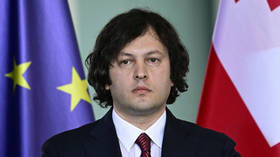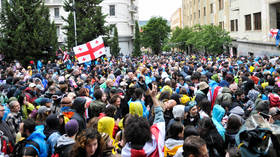 Georgian Prime Minister Irakli Kobakhidze has claimed that a European commissioner told him he could end up suffering the same fate as Slovak Prime Minister Robert Fico, who survived an assassination attempt last week. In a Facebook post on Thursday, Kobakhidze said that the unnamed commissioner warned him during a recent phone call that the West would take “a number of measures” against him if his government pressed ahead with a law requiring foreign NGOs in Georgia to disclose their funding. This story is republished from its original source on RT news.[1] Note that multiple countries, including the United States, have similar laws. Western opposition to the law is based on the wish to continue its traditional political strategies of secretly funding western NGOs to influence elections. Note also that Georgian President, Salome Zourabichvili, who opposes the bill and wants Georgia to become an EU country (thus putting it in danger like Ukraine), was until recently of French nationality, descended from Georgian refugees, and has US and EU ties. Her first husband was an Iranian-American World Bank economist Nicolas Gorjestani, Her second husband was a Georgian political refugee. Fortunately she is largely a figurehead and is Georgia's last directly elected president, as the country has changed its presidential election procedure.
Georgian Prime Minister Irakli Kobakhidze has claimed that a European commissioner told him he could end up suffering the same fate as Slovak Prime Minister Robert Fico, who survived an assassination attempt last week. In a Facebook post on Thursday, Kobakhidze said that the unnamed commissioner warned him during a recent phone call that the West would take “a number of measures” against him if his government pressed ahead with a law requiring foreign NGOs in Georgia to disclose their funding. This story is republished from its original source on RT news.[1] Note that multiple countries, including the United States, have similar laws. Western opposition to the law is based on the wish to continue its traditional political strategies of secretly funding western NGOs to influence elections. Note also that Georgian President, Salome Zourabichvili, who opposes the bill and wants Georgia to become an EU country (thus putting it in danger like Ukraine), was until recently of French nationality, descended from Georgian refugees, and has US and EU ties. Her first husband was an Iranian-American World Bank economist Nicolas Gorjestani, Her second husband was a Georgian political refugee. Fortunately she is largely a figurehead and is Georgia's last directly elected president, as the country has changed its presidential election procedure.
Georgian PM accuses EU of ‘blackmailing’ him with assassination threat
The bloc is trying to intimidate Georgia over its foreign agents law, Irakli Kobakhidze has said

FILE PHOTO: Georgian Prime Minister Irakli Kobakhidze. © Tobias SCHWARZ / AFP
Georgian Prime Minister Irakli Kobakhidze has claimed that a European commissioner told him he could end up suffering the same fate as Slovak Prime Minister Robert Fico, who survived an assassination attempt last week.
In a Facebook post on Thursday, Kobakhidze said that the unnamed commissioner warned him during a recent phone call that the West would take “a number of measures” against him if his government pressed ahead with a law requiring foreign NGOs in Georgia to disclose their funding.
“While listing these measures, he mentioned: ‘you see what happened to Fico, and you should be very careful’,” he wrote.
Fico was shot multiple times as he met with supporters outside a government meeting in the town of Handlova on May 15. He was rushed to hospital, underwent emergency surgery, and is currently recuperating from his injuries. His would-be assassin – allegedly a 71-year-old poet who disagreed with Fico’s suspension of military aid to Ukraine – has been charged with attempted murder and may face terrorism charges.
Georgia’s parliament passed the ‘Transparency of Foreign Influence Act’ last week. The law requires NGOs, media outlets, and individuals receiving more than 20% of their funding from abroad to register as entities “promoting the interests of a foreign power” and disclose their donors.
While the act has been vetoed by Georgia’s pro-Western president, Salome Zourabichvili, parliament is expected to override the veto.
Georgia does not want to become second Ukraine – PM
Despite similar yet more stringent foreign influence laws existing in the US, UK, and other Western nations, Georgia’s foreign agent law has been strongly condemned by US and EU officials, with Washington considering unspecified “actions” against Tbilisi and multiple EU members weighing sanctions, according to media reports.
“We have long been accustomed to this kind of insulting blackmail,” Kobakhidze wrote. “The parallel drawn with the attempted assassination of Robert Fico reminds us that in the form of the Global War Party, we are dealing with an extremely dangerous force that will do anything to bring chaos to Georgia.”
In an interview with Georgia’s Channel 1 on Wednesday, Kobakhidze argued that without a transparency law, foreign-funded NGOs operating in the country could easily foment a revolution akin to the US-backed ‘Maidan’ coup in Ukraine in 2014. “We want transparency... we don’t want to leave muddy water in this country, because a ‘Georgian Maidan’ could lead our country to very serious consequences, to its ‘Ukrainization’. We cannot agree with this,” he said.
NOTES
Originally published at https://www.rt.com/news/598129-georgia-slovakia-pm/


Add comment